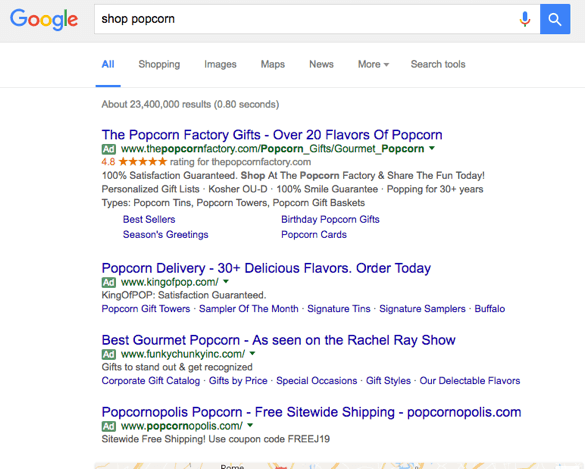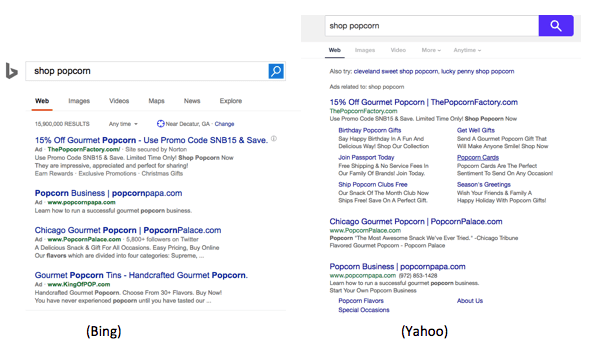Paid Search Marketing Pays Off
- By Mark Baker
- •
- 30 Nov, 2016
- •

Odds are if you own a business with any sort of marketing plan, you’ve heard of paid search marketing or search engine marketing. Basically, paid search marketing is the process of gaining website traffic by purchasing ads on search engines; or in English, buying digital ads for your company on platforms like Google and Bing. Paid search marketing for most is a win-win relationship; it connects your content with searchers actively seeking what you provide. First, companies enter into an auction and bid for a spot in a search engine’s sponsored links for keywords related to your business, and then you pay the search engine a small fee for each click on the ad.
1. Why should you use paid search campaigns?
You might ask, “why should my company pay to rank on a search results page when my homepage can rank organically for free?”, and it’s a good question. However, it’s important to remember that ranking organically isn’t free – it takes enormous time and effort to gain top spots on a search results page and these resources aren’t free for your company. Also, even if you have the resources to devote to improving your organic ranking and creating content, it’s a lengthy process and certainly won’t happen overnight. Paid search marketing provides immediate results for your company. Additionally, tracking is extremely accessible, spending can be easily monitored, and the ability to schedule ads and segment your audiences makes paid search marketing essential to a strategic plan.
The three main platforms that provide paid search marketing are Google Adwords, Yahoo Advertising, and Bing Ads. Here’s a little more about each platform and what they specifically provide.
2. Google Adwords
Adwords is the Google network’s paid marketing platform. The platform contains two different paid marketing networks that a company can choose from: the search network and the display network. We’ll focus on the search network because we’re concerned with paid search marketing in this article.
The search network on Google Adwords is a pay per click (PPC) platform, designed to be advantageous to Google, companies, and customers. The system is fairly simple. Companies create ads and bid on the most relevant keywords to their advertisements. Google then assesses their bid and the quality of the ad and provides it with a ranking. To asses the quality of the ad they’ll review your click through rate, the relevance of the advertisement to the keyword, and the landing page your ad leads to. The top ranked ads will then appear at the top of consumer’s search engine results page (SERP) when they’re looking for a product. Adwords rewards the most relevant, well targeted PPC campaigns by charging them less for ad clicks, so the more specific and useful to a customer your ads are, the better they’ll perform. Here’s an example of the Google search results page with the ads they gave a top ranking.
1. Why should you use paid search campaigns?
You might ask, “why should my company pay to rank on a search results page when my homepage can rank organically for free?”, and it’s a good question. However, it’s important to remember that ranking organically isn’t free – it takes enormous time and effort to gain top spots on a search results page and these resources aren’t free for your company. Also, even if you have the resources to devote to improving your organic ranking and creating content, it’s a lengthy process and certainly won’t happen overnight. Paid search marketing provides immediate results for your company. Additionally, tracking is extremely accessible, spending can be easily monitored, and the ability to schedule ads and segment your audiences makes paid search marketing essential to a strategic plan.
The three main platforms that provide paid search marketing are Google Adwords, Yahoo Advertising, and Bing Ads. Here’s a little more about each platform and what they specifically provide.
2. Google Adwords
Adwords is the Google network’s paid marketing platform. The platform contains two different paid marketing networks that a company can choose from: the search network and the display network. We’ll focus on the search network because we’re concerned with paid search marketing in this article.
The search network on Google Adwords is a pay per click (PPC) platform, designed to be advantageous to Google, companies, and customers. The system is fairly simple. Companies create ads and bid on the most relevant keywords to their advertisements. Google then assesses their bid and the quality of the ad and provides it with a ranking. To asses the quality of the ad they’ll review your click through rate, the relevance of the advertisement to the keyword, and the landing page your ad leads to. The top ranked ads will then appear at the top of consumer’s search engine results page (SERP) when they’re looking for a product. Adwords rewards the most relevant, well targeted PPC campaigns by charging them less for ad clicks, so the more specific and useful to a customer your ads are, the better they’ll perform. Here’s an example of the Google search results page with the ads they gave a top ranking.

So what are the advantages of using Adwords? According to a study conducted in 2013, 30% of users are unaware that Adwords search results are advertisements, and instead believed they were simply the most legitimate and relevant links. Not to sell the top ranked Adwords results short; they certainly take time and effort and to rank must link to legitimate sources. However, they certainly didn’t get to the top of the Search Engine Results Page organically. Additionally, the study found that a whopping 81% of users clicked on Google Adwords results instead of organic results when searching for a product – that’s huge. If used correctly, Google Adwords is very effective in driving traffic to your landing site and webpage, and dominates the Yahoo or Bing paid search marketing platforms in number of impressions.
Finally, Google Adwords provides the option to enhance your ad campaign. The platform allows you to target people based on time of day, location, device, etc. so that you can segment and target your campaign to make sure your budget is being spent responsibly and effectively.
3. Yahoo & Bing Networks
The Yahoo and Bing Search network advertising platforms are extremely similar to Google Adwords. The bidding and ranking processes are almost identical and both use a PPC model as well. Here are examples of the Search Engine Results Pages of the Bing and Yahoo Search Networks respectively.
Finally, Google Adwords provides the option to enhance your ad campaign. The platform allows you to target people based on time of day, location, device, etc. so that you can segment and target your campaign to make sure your budget is being spent responsibly and effectively.
3. Yahoo & Bing Networks
The Yahoo and Bing Search network advertising platforms are extremely similar to Google Adwords. The bidding and ranking processes are almost identical and both use a PPC model as well. Here are examples of the Search Engine Results Pages of the Bing and Yahoo Search Networks respectively.

The advertisements and layouts are very similar and look nearly identical on the Search Engine Results Page. So what is important to consider when choosing between platforms? Generally, the best advice is to know your consumer, and know what platforms they’re using. For some, Google Adwords is the clear choice and for others Bing or Yahoo make the most sense. Consult the analytics from your website and see which search engine is currently driving the most traffic to your site; this will indicate what platform your potential customers prefer to use and that’s generally the best platform for a company to start advertising with.
4. Best Practices
After deciding which platform to use, there are a few best practices to keep in mind when creating a paid search marketing campaign.
4. Best Practices
After deciding which platform to use, there are a few best practices to keep in mind when creating a paid search marketing campaign.
- Paying per click (PPC) often times delivers much better results than paying per impression (CPM), and usually produces a better conversion rate for your campaign.
- Keywords reign supreme – the more specific and relevant you can make your keyword, the better and make sure it carries over to your landing pages as well. Companies can use negative keywords to block searches that don’t relate to their product or service. Here’s more
on how to use negative keywords in your campaign.
- Create relevant compelling text ads. Don’t forget the quality of the ad in the madness of bidding on keywords and creating landing pages. Even after you’ve done your keyword work, google still takes into account the copy and design of the ad. Also, remember, you still need to compel customers to click on your ad even after the search engine places it on the results page.
- Segment, segment, segment - a well-designed campaign can mean low spending and impressive results if you are precise about your keywords and audience, and your text ads are relevant.
- Finally, as with any marketing effort, check your progress early and often. Consult analytics whenever possible and don’t be afraid to make changes to your ads to optimize your results.
Mark Baker
Mark Baker is a natural artist. Since starting his first business hand painting graphics onto vehicles in high school, Mark gained experience in the entertainment, sports, and retail industries before founding this company in 1993. Honest and pragmatic, Mark knows that anything can be accomplished with a great communication plan and creative thinking.





